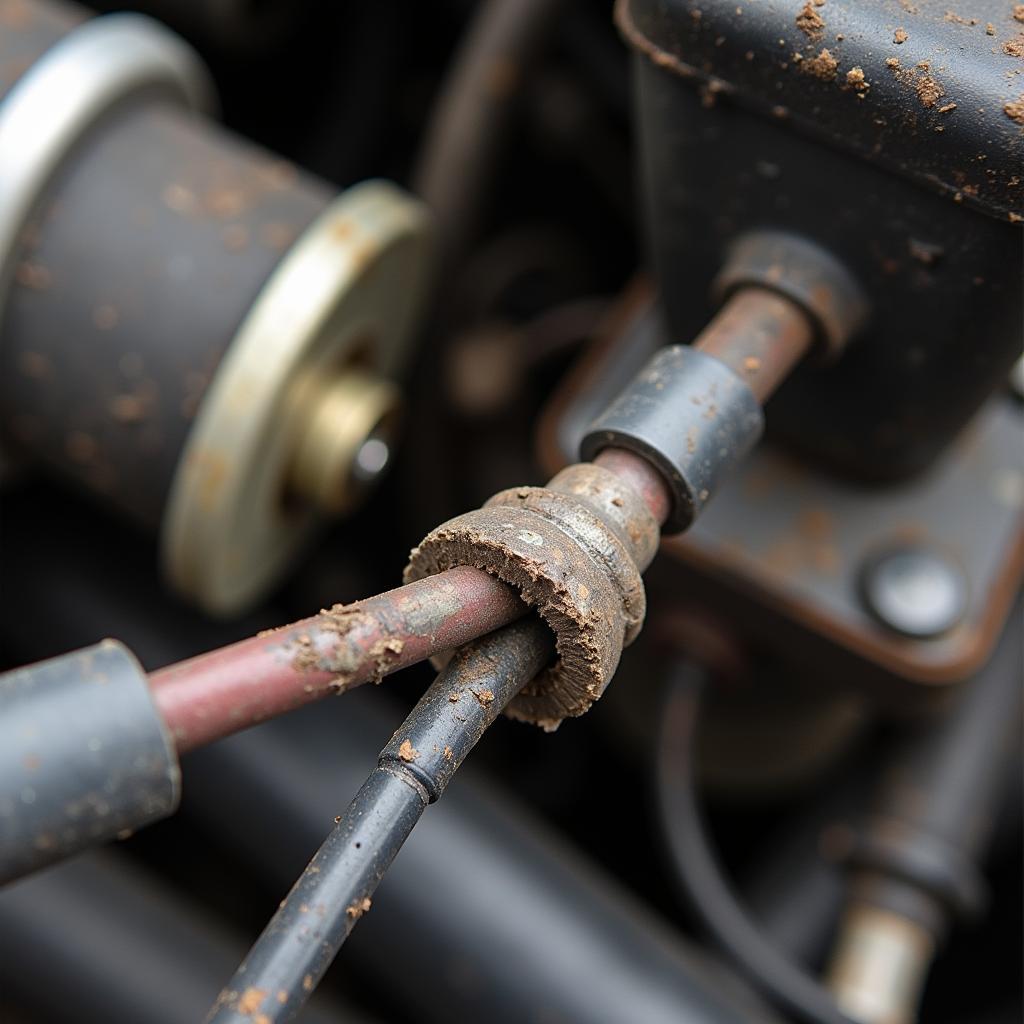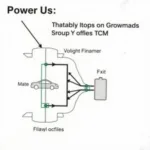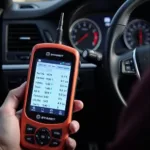The OBD2 code P0325 signals a problem with your vehicle’s knock sensor circuit. This code specifically indicates an issue with the knock sensor 1 circuit, typically found on Bank 1 of the engine (the side with cylinder #1). But what does that mean, and how does it impact your car’s performance? This comprehensive guide will delve into the details of the P0325 code, exploring its causes, symptoms, and providing a step-by-step guide to help you diagnose and potentially fix the issue.
What Does the P0325 Code Mean?
In modern vehicles, the knock sensor plays a crucial role in optimizing engine performance and preventing damage. It acts as the engine’s “ears,” listening for the distinct sounds of detonation or knocking. Detonation occurs when the air-fuel mixture in the combustion chamber ignites prematurely, creating a jarring knocking sound.
The knock sensor, a small piezoelectric device usually mounted on the engine block, detects these vibrations and converts them into electrical signals. These signals are then sent to the Engine Control Module (ECM), the car’s brain. Based on this input, the ECM can adjust the ignition timing to prevent further knocking and ensure smooth, efficient engine operation.
When the P0325 code is triggered, it indicates that the ECM is not receiving a plausible signal from the knock sensor 1 circuit. This could be due to a faulty sensor, a wiring issue, or even a problem with the ECM itself.
Common Causes of OBD2 Code P0325
Understanding the potential causes of the P0325 code is crucial for effective troubleshooting. Here are some common culprits:
-
Faulty Knock Sensor: The knock sensor itself is a common culprit. Exposure to extreme temperatures, vibrations, and engine fluids over time can degrade its performance and lead to failure.
-
Wiring Problems: Damaged, corroded, or loose wiring within the knock sensor circuit can disrupt the signal transmission between the sensor and the ECM.
 Faulty Wiring in Knock Sensor
Faulty Wiring in Knock Sensor
-
Faulty ECM: In rarer cases, a malfunctioning ECM can also trigger the P0325 code.
-
Low-Quality Fuel: Using low-octane fuel can cause engine knocking, leading to increased stress on the knock sensor and potentially triggering the code.
-
Mechanical Engine Problems: Issues like excessive carbon buildup in the combustion chamber or incorrect valve timing can also contribute to engine knocking and trigger the P0325 code.
Symptoms of a P0325 Code
Apart from the illuminated Check Engine Light, the P0325 code often manifests through noticeable performance issues, including:
-
Engine Knocking or Pinging: This is the most obvious symptom, indicating that the air-fuel mixture is detonating prematurely.
-
Decreased Engine Performance: To protect the engine from damage, the ECM will retard the ignition timing when a knock sensor problem is detected. This can result in reduced engine power and acceleration.
-
Poor Fuel Economy: Retarded ignition timing can also negatively impact fuel economy.
-
Hesitation or Stumbling During Acceleration: The engine might hesitate or stumble when accelerating due to the improper ignition timing.
How to Diagnose and Fix OBD2 Code P0325
Addressing the P0325 code requires a systematic approach to pinpoint the root cause. Here’s a step-by-step guide:
-
Verify the Code with an OBD2 Scanner: Before proceeding, use an OBD2 scanner to confirm the presence of the P0325 code and check for any other codes that might be stored.
-
Inspect the Knock Sensor and Wiring: Visually inspect the knock sensor for any signs of damage, corrosion, or loose connections. Carefully examine the wiring harness for any breaks, fraying, or damage.
-
Test the Knock Sensor: If no visible damage is found, test the knock sensor using a multimeter to check its resistance and voltage output. Refer to your vehicle’s repair manual for specific testing procedures and values.
- Check the Continuity of the Wiring: Use the multimeter to test the continuity of the wiring between the knock sensor and the ECM. This will help identify any open or shorted circuits.
-
Inspect the ECM: While less common, a faulty ECM can also cause the P0325 code. Check the ECM for any signs of damage or corrosion. If necessary, consult a qualified mechanic to test the ECM.
-
Address the Underlying Issue: Based on your diagnosis, replace the faulty knock sensor, repair the wiring, or replace the ECM if needed.
Expert Insight: “Many car owners overlook the importance of using high-quality fuel. Consistently using low-octane fuel can lead to chronic knocking, significantly shortening the lifespan of your knock sensor.” – David Anderson, ASE Certified Master Technician
Conclusion
The OBD2 code P0325, signaling a problem with the knock sensor 1 circuit, can significantly impact your vehicle’s performance and potentially lead to engine damage if left unaddressed. By understanding its causes, recognizing the symptoms, and following the diagnostic steps outlined in this guide, you can effectively resolve the issue and ensure your engine runs smoothly and efficiently for miles to come.
FAQs About OBD2 Code P0325
Can I drive my car with a P0325 code?
While you might be able to drive for a short distance, it’s not recommended to drive with a P0325 code. Ignoring the issue can lead to engine damage over time.
How much does it cost to fix the P0325 code?
The cost of repair varies depending on the underlying cause. Replacing a knock sensor can cost between $100 to $300, while a new ECM can cost significantly more.
Can a bad spark plug cause a P0325 code?
Although not directly, a faulty spark plug can contribute to engine knocking, potentially triggering the P0325 code.
How often should the knock sensor be replaced?
The knock sensor doesn’t have a specific replacement interval and should be replaced if it malfunctions.
Can I fix the P0325 code myself?
If you have some mechanical skills, you might be able to diagnose and replace the knock sensor yourself. However, if you’re unsure, it’s always best to consult a qualified mechanic.
Need more help with OBD2 codes? Check out our knock sensor test obd2 page.
Get in touch with us today for expert advice and solutions for all your car diagnostic needs. Contact us via WhatsApp: +1(641)206-8880 or Email: [email protected]. Our team is available 24/7 to assist you.

